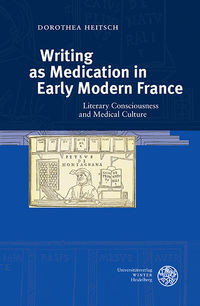
Writing as Medication in Early Modern France
Literary Consciousness and Medical Culture
1. Edition, 2017
261 Pages
ISBN: 978-3-8253-6714-5
Product: Book
Edition: Hardcover
Subject: Romanistik
Series: Regensburg Studies in Gender and Culture, Volume No.: 9
Available: 26.07.2017
Keywords:
Philosophie, gender studies, französische Literatur, Renaissance, Melancholie, Humor, Montaigne, Michel de, Rabelais, Francois, weibliche Autorschaft, Leiblichkeit, 16. Jahrhundert, 15. Jahrhundert, 17. Jahrhundert, Seele, Medical Humanities, therapeutisches Schreiben, Ebreo, Leone, Abrabanel, Jehuda, Crenne, Hélisienne de, Gournay, Marie de, Dolce Stil Novo, Sinneserfahrungen, Alchemie
In this study, D. Heitsch examines fifteenth- to seventeenth-century French authors who treat writing as a process of medication and whose literary production effectively yields a therapeutic substance. Through reference to Plato, Aristotle, Galen, Ficino, and advocates of alternatives to Western medicine such as John Mesue and Leone Ebreo, these writers emphasize the material/gendered soul and the role of the body in cognitive functions, illustrating knowledge as a result of physical interaction.
The study explores Hélisenne de Crenne alongside the ‘pneumo-physiology’ of Galen and the ‘dolce stil novo’, Rabelaisian anatomy together with the anti-Arabist Champier, and debates among natural philosophical poets on the transmigration of souls. The author also considers Marie de Gournay in relation to Juan Huarte’s humoral theory and Jean d’Espagnet’s alchemical philosophy, as well as Michel de Montaigne’s interest in Jacques Dubois’s Arab-influenced approaches to medicine.
""
Dorothy L. Stegman in: The Sixteenth Century Journal, Vol. L.4 (2019), 1312-1314
""
Reinier Leushuis in: South Atlantic Review, 85.3 (2020), 198-201
""
Caroline Petit in: H-France Review, Vol. 19 (2019), Nr. 228, URL:https://h-france.net/vol19reviews/vol19no228petit.pdf
""
Violaine Giacomotto-Charra in: Renaissance Quarterly, LXXII.1 (2019), 382-383, DOI: https://doi.org/10.1017/rqx.2018.102
""
Daniel Fliege in: Jahrbuch Literatur und Medizin, Bd. X (2018), 183ff




